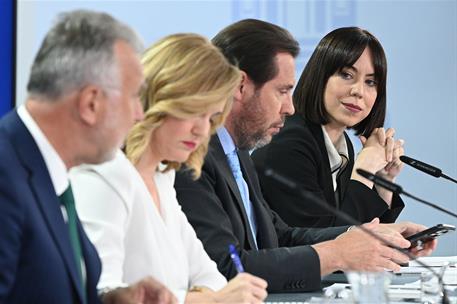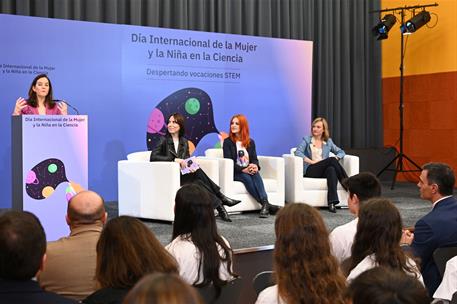At the presentation of the National Office of Scientific Advice (ONAC)
Pedro Sánchez announces the incorporation of more than fifty scientific advisors into the General State Administration
President's News - 2024.6.20
Images of the ONAC presentation event | Pool Moncloa/Jorge Villar y Javier Amescua - 20.06.2024
CSIC headquarters, Madrid
The President of the Government of Spain, Pedro Sánchez, has spoken at the presentation of the National Office of Scientific Advice (ONAC), a new body for scientific advice that will strengthen the Government in its decision-making processes, and represents, in the words of the president, "one of the most transformative steps for our society in the short, medium and long term"; a "milestone" which, if it persists over time, "will change our country for the better".
With the aim of promoting this national "ecosystem" of scientific consultancy under the principles of "rigour and efficiency", and so that "it really does work", Pedro Sánchez announced that in the coming months, "more than fifty scientific advisors will be incorporated into the General State Administration" with different mechanisms, because "if we want more science in government, we have to have more scientists in the public administration".
As he explained, "We are going to create the figure of the scientific advisor in the cabinet of each ministry", dedicated exclusively to connecting any questions the ministries may have with university and public research centres' answers to them. He also announced that "a programme of research stays will be set up so that scientists can spend between six and eight months in the different ministries", which will familiarise them with the functioning and needs of the State Administration, to help them deal with specific challenges pertaining to their specialisation.
He added that "a unit will also be created to support scientific consultancy for the Government", located at the CSIC headquarters and responsible for "connecting the needs of the Executive with the talent and knowledge generated in our universities and research centres". In addition, the Executive is going to strengthen Moncloa Palace's National Scientific Advisory Office, which will be responsible for coordinating, instructing and supporting all these profiles, managing the entire ecosystem and ensuring that the voice of science is heard, in a comprehensive manner, even at the highest level of government, that of the presidency.
"Very few countries in the world have a scientific advisory network like the one we are about to deploy," said President Sánchez, who announced that the calls for applications for the positions of ministerial and CSIC support unit consultants will be published today, encouraging all those interested in making a positive impact with their talent to apply. "We are looking for the best scientists, because we want the best policy for Spain," he stressed.
€2 million to encourage applied research and studies
At the event, which took place at the CSIC and was attended by the Minister for Science, Innovation and Universities, Diana Morant, the chief executive also announced the publication today in the Official State Gazette of a call for applications for €2 million to finance randomised experiments in public innovation and to launch the exploitation of ministerial databases, with the aim of converting the rich raw information that many bodies of the General State Administration possess into academic knowledge that will in turn serve to improve the design and implementation of our public policies.
He also informed of the foreseen publication in July of the draft Royal Decree that will modify the system of five-year and six-year periods for teaching and research staff, with the aim of encouraging and rewarding transfer and applied research work.
Last, the chief executive referred to a third and final component of this ecosystem, institutional mechanisms, so that the next time there is an emergency - as was the pandemic - the administrations have well-defined mechanisms to identify and consult experts quickly and rigorously.
"May Spain illuminate its path with the flame of knowledge".
During his speech, Pedro Sánchez alluded to the fact that we are living at a time when "our societies must decide what kind of leadership we want for the future. Some people want a return to the so-called 'strong men and women'; leaders that mobilise the masses with simplistic diagnoses of reality and impossible promises, in many cases alien and contrary to scientific evidence".
"I don't want that for my country," Sanchez said. "I want Spain to light its path with the flame of knowledge. I want to make the scientific principles of rigour and experimentation the cornerstones of its Government".
"Science cannot decide," he continued, "because the sovereignty of the people does not lie with science, but with institutions and democratically elected representatives, but those institutions and representatives have a moral obligation and a practical need to listen to science and to rely on it as much as possible. Because a democracy based on science is a more effective, more robust and, what matters most to me, more equitable democracy"; and "the advisory ecosystem that we are launching today has been created to this end".
Non official translation






